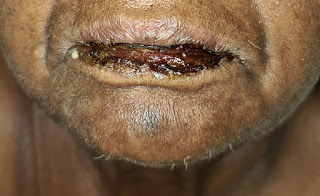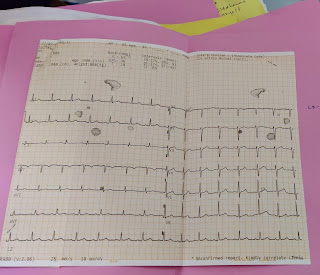Case of 18years old boy with weakness of lower limbs
G sai tejaswini
Roll no 61
Ihave be given this case to solve ina an attempt and to understand the topic of paitient clinical data analysis to develop my competency in reading and comprehending clinical data including history, clinical findings , investigations and come up with diagnosis and treatment plan.
Entire real patient clinical problem inthis link herehttps://hitesh116.blogspot.com/2020/05/elog-13th-may-2020.html?m=1
A18 year old male patient came with complaints of difficulty in walking , bilateral lowerlimb weakness, pain in calf muscles since 1month.
Analysis of the case:
By above mentioned data inthe link. The features may be of lower motor lesions.
LOWER MOTOR LESIONS:at the level of
-anterior horn cells
-nerve roots
-peripheral nerves
-neuromuscular junction
-muscle
ANTERIOR HORN CELLS :may be effected by polio, spinal muscular atrophy( mainly along with areflexia and weakness, hypotonia, may involve respiratory muscles genetic disorder which can be but patient donot have respiratory problems and it is ruled out. Diagnosed by genetic testing ct , mri. Hence ruled out.
NERVE ROOTS(RADICULOPATHIES): disc herniations may be due to traumatic cause there is no traumatic history so it can be rules out. CT, MRI can be used to rule out.
PERIPHERAL NERVES: peripheral neuropathy canbe diagnosed by nerve conduction studies which are done and diagnosed as sural nerve, common peroneal nerve neuropathy . By the features and nerve conduction studies itmay be the cause of symptoms in patient.
NEUROMUSCULAR JUNCTION: there are no features suggestive of myasthenia gravis .
Diagnosis can be by clinical feature, electromyography, blood test (antibodies), edrophonium test.
MYOGENIC CAUSES:
Genetic-muscle dystrophy can be diagnosed by serum creatinine kinase levels -which were normal levels in patient(92IU/L), muscle biopsy , genetic testing(dystrophin gene), ultra sound (muscle thickness).
Inflamatory causes:polymyositis canbe diagnosed by muscle biopsy .
Endocrine causes-thyroid myopathy(thyroid profile is normal) so it can be ruled out.
INVESTIGATIONS
Renal function test - levels of calcium , phosphorous ,potassium level detection , complete urine examination can be used to rule out rabdomyolsis
ECG can be done to find out the cardiac muscle involvement.
PAIN , FEVER:this may be due to inflammation in muscle.
The features may be caused due to vitamin deficiency occured due to alcohol intake and poor diet(B1, B12,)
SCABIES: on examination there are lesions of scabies .
ANATOMICAL REGION INVOVLED :peripheral nerves(sural nerve, common peronela nerves).
PHYSIOLOGICAL DISABILITY: weakness of lower limbs causing difficulty in walking , standing from sitting position wearing of foot wear, in climbing staires.
PATHOLOGY: axon or myelin level or cell body level of nerve( wallerian degeneration).
TREATMENT: paracetmol, Bcomplex, permithrin ointment(scabies).
Non pharmacological: physiotherapy, acupuncture, diet.
References:https://hitesh116.blogspot.com/2020/05/elog-13th-may-2020.html?m=1
https://www.healthline. com.(peripheral nueropathy)
Roll no 61
Ihave be given this case to solve ina an attempt and to understand the topic of paitient clinical data analysis to develop my competency in reading and comprehending clinical data including history, clinical findings , investigations and come up with diagnosis and treatment plan.
Entire real patient clinical problem inthis link herehttps://hitesh116.blogspot.com/2020/05/elog-13th-may-2020.html?m=1
A18 year old male patient came with complaints of difficulty in walking , bilateral lowerlimb weakness, pain in calf muscles since 1month.
Analysis of the case:
By above mentioned data inthe link. The features may be of lower motor lesions.
LOWER MOTOR LESIONS:at the level of
-anterior horn cells
-nerve roots
-peripheral nerves
-neuromuscular junction
-muscle
ANTERIOR HORN CELLS :may be effected by polio, spinal muscular atrophy( mainly along with areflexia and weakness, hypotonia, may involve respiratory muscles genetic disorder which can be but patient donot have respiratory problems and it is ruled out. Diagnosed by genetic testing ct , mri. Hence ruled out.
NERVE ROOTS(RADICULOPATHIES): disc herniations may be due to traumatic cause there is no traumatic history so it can be rules out. CT, MRI can be used to rule out.
PERIPHERAL NERVES: peripheral neuropathy canbe diagnosed by nerve conduction studies which are done and diagnosed as sural nerve, common peroneal nerve neuropathy . By the features and nerve conduction studies itmay be the cause of symptoms in patient.
NEUROMUSCULAR JUNCTION: there are no features suggestive of myasthenia gravis .
Diagnosis can be by clinical feature, electromyography, blood test (antibodies), edrophonium test.
MYOGENIC CAUSES:
Genetic-muscle dystrophy can be diagnosed by serum creatinine kinase levels -which were normal levels in patient(92IU/L), muscle biopsy , genetic testing(dystrophin gene), ultra sound (muscle thickness).
Inflamatory causes:polymyositis canbe diagnosed by muscle biopsy .
Endocrine causes-thyroid myopathy(thyroid profile is normal) so it can be ruled out.
INVESTIGATIONS
Renal function test - levels of calcium , phosphorous ,potassium level detection , complete urine examination can be used to rule out rabdomyolsis
ECG can be done to find out the cardiac muscle involvement.
PAIN , FEVER:this may be due to inflammation in muscle.
The features may be caused due to vitamin deficiency occured due to alcohol intake and poor diet(B1, B12,)
SCABIES: on examination there are lesions of scabies .
ANATOMICAL REGION INVOVLED :peripheral nerves(sural nerve, common peronela nerves).
PHYSIOLOGICAL DISABILITY: weakness of lower limbs causing difficulty in walking , standing from sitting position wearing of foot wear, in climbing staires.
PATHOLOGY: axon or myelin level or cell body level of nerve( wallerian degeneration).
TREATMENT: paracetmol, Bcomplex, permithrin ointment(scabies).
Non pharmacological: physiotherapy, acupuncture, diet.
References:https://hitesh116.blogspot.com/2020/05/elog-13th-may-2020.html?m=1
https://www.healthline. com.(peripheral nueropathy)



Comments
Post a Comment